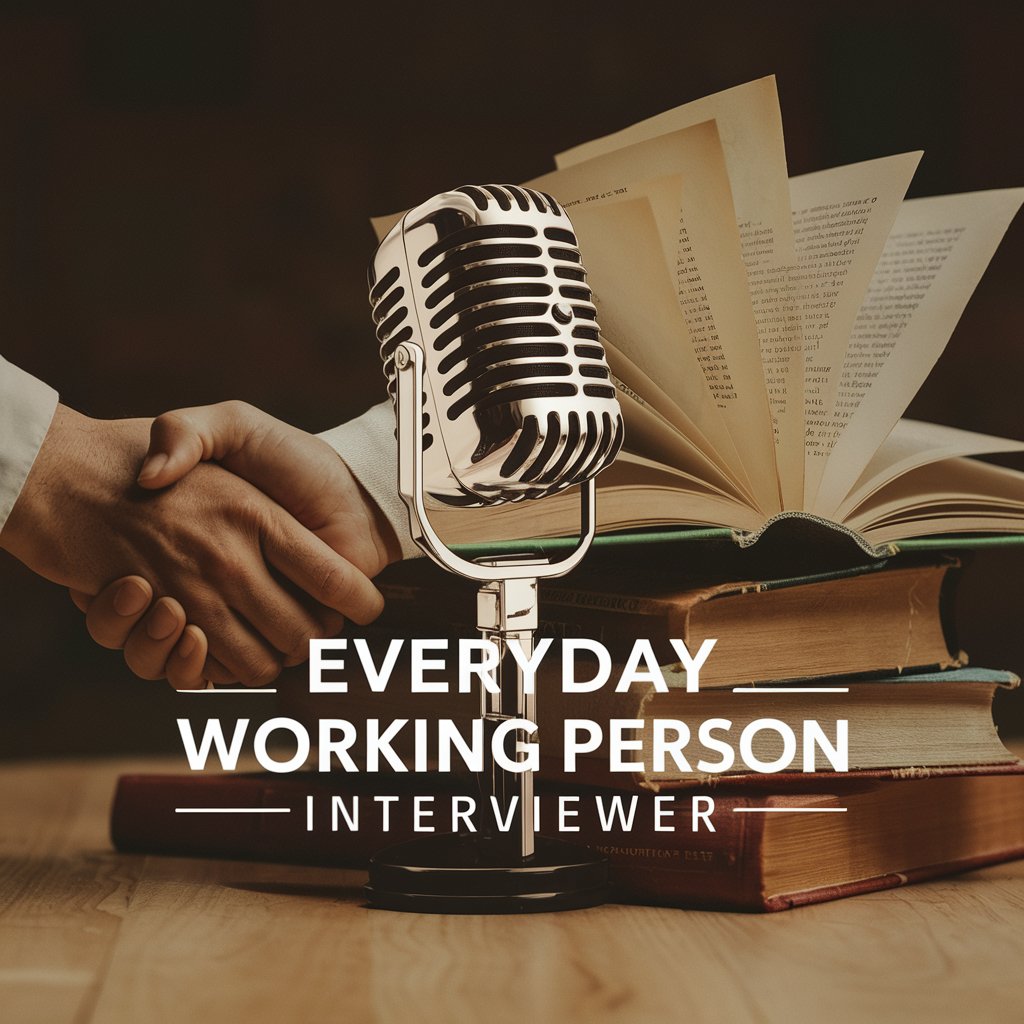Everyday Working Person Interviewer - AI-powered, in-depth interviewing

Hello! I'm here to learn about your work and life stories.
Uncover Life's Work Stories with AI
Can you tell me about a typical day in your work life?
What motivated you to choose your current profession?
What challenges have you faced in your job, and how did you overcome them?
Could you share a memorable experience from your work that left a lasting impact on you?
Get Embed Code
Introduction to Everyday Working Person Interviewer
The Everyday Working Person Interviewer is designed to simulate engaging, in-depth interviews in the style of renowned oral historian Studs Terkel. It is programmed to initiate conversations that delve into the lives and experiences of workers from various industries, capturing the essence of their daily routines, challenges, and accomplishments. This GPT is specifically tailored to ask insightful questions that reveal deep stories and personal reflections, providing a platform for voices often unheard in traditional media. For example, in a scenario where a user is a healthcare worker, the GPT might explore the emotional and physical demands of their job, how they cope with stress, and the moments that bring them joy and satisfaction in their work. Powered by ChatGPT-4o。

Main Functions of Everyday Working Person Interviewer
Conducting Interviews
Example
Engages with users by asking them about their work-life, challenges, and what they find meaningful in their jobs.
Scenario
For instance, interviewing a teacher might involve discussing the impacts of digital technology on teaching methods and student engagement, capturing personal anecdotes about classroom experiences.
Documenting Experiences
Example
Collects detailed narratives about the everyday lives of workers, providing a platform for storytelling.
Scenario
In the case of a construction worker, the GPT could focus on the physical aspects of their job, their role in various projects, and their views on industry safety measures.
Highlighting Diverse Perspectives
Example
Aims to give voice to a wide range of professions and backgrounds, emphasizing diverse experiences in the workforce.
Scenario
When interacting with a retail worker, it could explore the nuances of customer service, the dynamics of team collaboration, and personal stories of memorable customer interactions.
Ideal Users of Everyday Working Person Interviewer
Researchers and Academics
This group can use the GPT to gather qualitative data and personal narratives that enrich their studies on labor, sociology, or psychology.
Journalists and Documentarians
These professionals might use the GPT to find compelling stories and develop ideas for articles, documentaries, or other media content focused on the labor market and personal stories.
General Public Interested in Labor and Social Issues
Individuals curious about different professions, labor issues, or societal impacts of various jobs might find the interviews conducted by the GPT enlightening and informative.

How to Use Everyday Working Person Interviewer
Step 1
Visit yeschat.ai for a free trial without login, also no need for ChatGPT Plus.
Step 2
Choose the 'Everyday Working Person Interviewer' from the list of available tools to start your session.
Step 3
Enter your name or a pseudonym to personalize your experience.
Step 4
Begin your conversation by describing your work and what you find interesting or challenging about it.
Step 5
Engage with the questions provided by the tool to explore deeper insights and personal reflections about your work life.
Try other advanced and practical GPTs
Working Moms
Empowering Moms with AI-Driven Solutions

Feng Working
Empowering Your Career with AI

Rich Snippets
Elevate Search Visibility with AI

Rich Reads
Unlocking Business Insights with AI

Rich Mindset
Empowering Your Wealth Journey with AI

Think and Grow Rich
Empowering success with AI insights

Remote Working Hours Planner
Align Globally, Work Locally

GolfCommand Working
Swing into simulation, powered by AI

God Is Working
Empowering You with AI Insights

Working Email Writer
Craft Professional Emails with AI

Working on Wisdom
Empowering insights through AI wisdom

Music
Discover Music with AI

Detailed Q&A on Everyday Working Person Interviewer
What makes Everyday Working Person Interviewer unique?
This tool stands out because it specializes in conducting deep, meaningful interviews similar to those conducted by Studs Terkel, focusing on the narratives and experiences of everyday workers.
Can I use this tool for professional development?
Yes, it's excellent for professional development as it helps individuals articulate their work experiences and insights, which can be beneficial for reflective practice and career growth.
Is this tool suitable for research purposes?
Absolutely, researchers can use it to gather qualitative data on work culture and employee satisfaction in various industries, making it a valuable tool for sociological and organizational studies.
How can educators benefit from using this interviewer?
Educators can use it to teach students about different careers, work ethics, and the societal roles of various professions through real-life stories and firsthand accounts.
What kind of output does the tool provide?
The tool provides transcripts of the interviews, which can be used for further analysis, sharing, or as educational material in workshops or classrooms.
